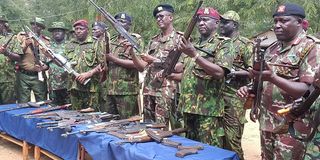Police recover two guns stolen from slain officers in Kapedo

Rift Valley Regional Commissioner Maalim Mohamed (third right) and other security officers when he toured the volatile Tot in Kerio Valley on June 16,2022, a week after the interior CS Fred Matiang'i ordered a massive security operation in the disturbed area. Tens of illegal guns were recovered at the time.
What you need to know:
- Regional Commissioner said security agencies have the names of suspects and they will be smoked out of their hideouts.
Mr Mohamed promised to deploy more police reservists in Turkana East and parts of Samburu East, Samburu West and Samburu North to supplement regular security officers in beefing up security and restoring order.
Two firearms belonging to eight security officers killed alongside a local chief and two civilians in Namariat, Kapedo/Napeitom ward, Turkana East, 10 days ago have been recovered.
The weapons were found in Tiaty constituency, said Rift Valley Regional Commissioner Maalim Mohamed.
“We are planning to carry out a simultaneous disarmament exercise in the volatile counties where the armed criminals have fled to,” he said.
“It is high time they surrender the illegal firearms because we are not going to compromise with them anymore.”
Names
He said security agencies have the names of suspects and they will be smoked out of their hideouts.
He said an earlier security operation against criminals in the Kerio Valley during which a dusk-to-dawn curfew was imposed had been effective.
“We are also calling on the locals to give us information concerning these suspects and where they have fled to because these are people who are known and they are hiding in the villages,” he added.
“We must have value for the money spent on these exercises rolled out in the North Rift and this can only come into fruition if all of us are involved.”
Mr Mohamed promised to deploy more police reservists in Turkana East and parts of Samburu East, Samburu West and Samburu North to supplement regular security officers in beefing up security and restoring order.
“We deployed more than 80 NPRs in the banditry-prone Baringo North and Baringo South sub-counties last year and we have seen how sanity is slowly returning to the deserted villages,” he said.
“We will deploy more of them to other volatile areas so that we can roll out development.”
Open up area
Plans were underway to open up the affected villages by building security roads and more schools so that boys can stay in class and avoid being recruited into banditry.
North Rift residents have repeatedly accused the government of being lenient on bandits, noting that some are arrested but soon return to their village and resume committing crimes.
“Some of them are known and their names have been submitted to the provincial administration, yet none has been arrested,” said Richard Chepchomei, from Baringo North.
But chiefs in those areas claim that arresting criminals is not easy as they are armed with sophisticated firearms.
Criminals flee
They said most criminals flee to the neighbouring counties of West Pokot, Samburu, Laikipia and Turkana when they get wind of looming disarmament, making it harder to track them down.
Though the names of banditry and livestock theft suspects are sometimes given to administrators, they flee to other areas and change their names, said a chief in the Kerio Valley, who did not want to be named.
“Most of the armed criminals have no identification cards and they purposely do so to hide from the authorities just in case their crimes are known,” the chief said.
“The few who have IDs flee to remote areas, where they cannot be tracked and they change their names, paralyzing efforts to nab them. Most disappear for several years, change their villages and you will not see them again.”





